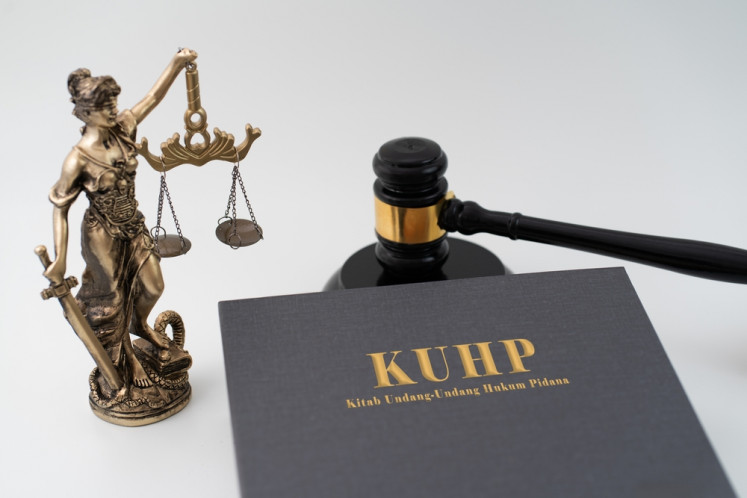Popular Reads
Top Results
Can't find what you're looking for?
View all search resultsPopular Reads
Top Results
Can't find what you're looking for?
View all search resultsBig operators seek to nix CDMA business, defer assets to GSM
As customers of Code Division Multiple Access (CDMA) technologies in the country are waning, several mobile operators ' particularly those with vast resources ' are considering terminating their services and focusing on other products
Change text size
Gift Premium Articles
to Anyone
A
s customers of Code Division Multiple Access (CDMA) technologies in the country are waning, several mobile operators ' particularly those with vast resources ' are considering terminating their services and focusing on other products.
Honesti Basyir, finance director at PT Telekomunikasi Indonesia (TLKM), said the CDMA ecosystem was 'moribund'.
The listed, state-owned telecommunications operator, popularly referred to as Telkom, provides CDMA services under the brand TelkomFlexi.
'Currently, we have approximately 18 million TelkomFlexi subscribers,' he said, adding that roughly 60 percent of them were in Java.
However, he noted that average revenue per user (ARPU), or the revenue gained from individual subscriptions, from its CDMA business was 'far lower' than that earned from its Global System for Mobile Communications (GSM) services.
Telkom provides GSM services through its subsidiary, PT Telekomunikasi Selular (Telkomsel), in which its average ARPU reached Rp 36,000 (US$3.6) in the first quarter of 2013.
'We have seen both the top-line and bottom-line numbers of our CDMA business customers,' he said, although declining to reveal the amounts.
Telkomsel remains the main revenue driver for Telkom, contributing approximately 71.3 percent to the Rp 19.5 trillion its parent company earned in the first quarter of 2013.
Honesti added that the waning CDMA business had prompted the operator to 'gradually terminate' its CDMA services.
'We do not want to play in the CDMA market any longer and we will gradually withdraw this service over two to three years,' he said, adding that existing CDMA subscribers would be transferred to GSM.
He also said the operator would kill its CDMA services in areas with low ARPU first by switching off equipment, such as base transceiver stations (BTS), which run the services.
Telkom provides CDMA services through at least 4,000 BTS.
'We will not incur losses in disposing of the equipment because depreciation-wise, they would be worth nothing,' Honesti said.
Telkom then planned to divest Flexi's assets, especially the 850 megahertz frequency the CDMA services operated on, to fortify Telkomsel's business of providing data services, Honesti noted.
'We might have to return our CDMA frequency license back to the government before reapplying for it again for GSM use,' he said.
The government, via the Communications and Information Ministry, grants licenses ' hence, terms
and conditions ' to telecommunications operators on the use of frequencies.
Alexander Ruslie, the CEO of PT Indosat (ISAT), similarly said the mobile operator was considering using its CDMA frequency for GSM-based services.
He said the company still wanted to use the frequency to provide telecommunications services.
Indosat provides CDMA services under the brand, StarOne. Roughly 98.9 percent of their total 55.9 million subscriptions are pre-paid customers, with IM3 ' a GSM brand ' being the most popular.
Alexander added that the operator was conducting discussions with industry counterparts, including Telkom, on the future of CDMA, including on the feasibility of merging all CDMA businesses.
'We are discussing issues such as, 'should the share ownership in any future company be based on frequency owned or capital injected?'' he said, adding that no significant progress had yet taken place in the talks.
The State-owned Enterprises Ministry previously stated that it would support the merger between TelkomFlexi and StarOne. The Indonesian government has a 51.2 percent and 14.3 percent stake, respectively, in Telkom and Indosat.
Communications and Information Ministry spokesman Gatot S. Dewabroto said the ministry had also begun to review the future of CDMA.
'What has concerned operators is now concerning us, too,' he said.
Besides reviewing the swapping of CDMA licenses for GSM licenses, he added, the ministry was also mulling the use of next generation technology on the frequency currently utilized for CDMA.
'This also includes reviewing the possibility of utilizing the frequency for Long-Term Evolution [LTE] technology,' he noted.










